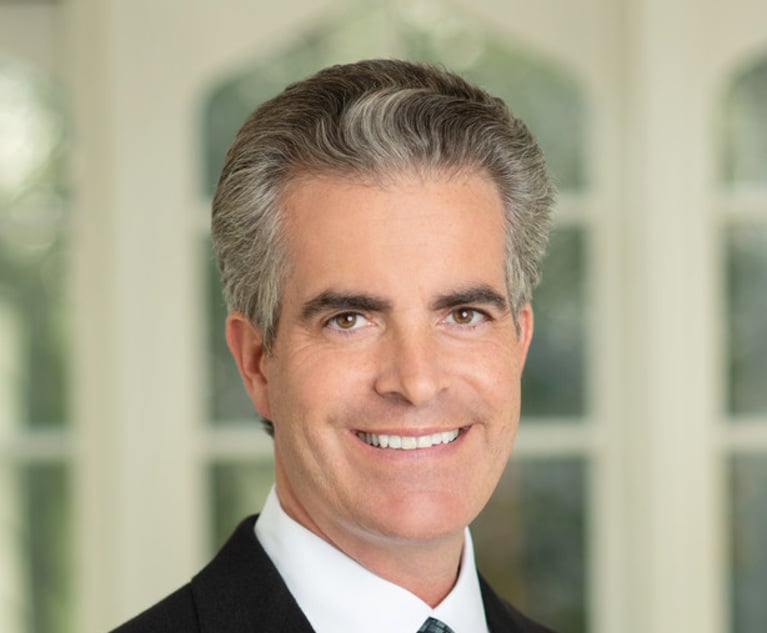Phila. Jury Awards $2.5M for Man Who Suffered Fatal Fall After Eye Exam
A Philadelphia jury has hit two medical organizations with a $2.5 million verdict over a wheelchair-bound man who suffered a fatal fall after an eye care center released him on his own into the bright summer sun following an eye procedure that left his pupils dilated and his vision fuzzy.
December 11, 2019 at 03:27 PM
5 minute read
 Photo: Shutterstock
Photo: Shutterstock
A Philadelphia jury has hit two medical organizations with a $2.5 million verdict over a wheelchair-bound man who suffered a fatal fall after an eye care center released him on his own into the bright summer sun following an eye procedure that left his pupils dilated and his vision fuzzy.
The jury that presided over the case Pratt v. Wills Eye Hospital hit the Wills Eye Hospital and Jefferson University Hospital with the multimillion-dollar award Monday following a six-day trial before Philadelphia Court of Common Pleas Judge Frederica Massiah-Jackson. The verdict included $1 million in wrongful death and $1.5 million survival damages, and liability was allocated as 30% against Wills Eye Hospital and 70% against Jefferson University Hospital.
Plaintiff Willa Robinson, the eldest daughter of the deceased William Pratt, had argued that her father, a 75-year-old bilateral leg amputee, should not have been discharged on his own after an eye exam, and that this failure caused him to fall, face-first, down an exterior set of concrete steps while strapped to his wheelchair. William Pratt died two weeks after the fall.
Eisenberg, Rothweiler, Winkler, Eisenberg & Jeck attorneys Todd Schoenhaus and Joshua Schwartz, who represented the plaintiffs, said they were happy the verdict could provide some closure.
"Although no amount of money will bring their father back, Mr. Pratt's children were pleased that the jury held the hospitals accountable for his tragic loss," the attorneys said in an emailed statement.
Donna Nadel Kramer and Steven Medina of Post & Schell represented Wills Eye Hospital. James Young and Samantha Conway of Christie & Young represented Thomas Jefferson University Hospital. Neither Kramer nor Young returned a message seeking comment.
According to the plaintiff's pretrial memo, Pratt had undergone similar eye exams in the months leading up to the July 2015 visit that resulted in his fatal fall. He came to the eye care center with complaints of right eye pain and sensitivity to light. The memo said the intake nurse did not assess his transportation needs, but he underwent the testing anyway, and was found to have a corneal abrasion and cataract in his right eye, as well as diabetic retinopathy in both eyes.
The tests included pharmacologically dilating his pupils, which can cause blurry vision and can last for longer than two hours.
According to the memo, he was discharged less than two hours after the dilation, and the discharge nurse did not confirm his travel arrangements, or contact any family or friends to help him return home. The nurse also did not offer him sunglasses, the memo said, noting that the sun was bright that day.
After he was found at the bottom of six cement steps near the facility, he was taken to the emergency room at Jefferson, where he told his doctors he had blurry vision after he'd been discharged and had been blinded by the sunlight.
Pratt's expert ophthalmologist, Dr. Paul Glass, said it was the nurse's responsibility to make sure a patients' transportation needs are met, and that the intake nurse's treatment did not meet the standard of care. The plaintiff's internal medicine expert, Dr. Aaron Gottesman, opined that the doctors have the ultimate responsibility when it comes to the patients' safety, and both Pratt's treating doctor and the discharge nurse breached the standard of care. Gottesman also opined that Pratt died from side effects he suffered as a result of the brain and cervical cord injuries he sustained in the fall.
In its pretrial memo, Jefferson said its treatment was well within the standard of care. According to the memo, the hospital's ophthalmology expert, Dr. Dean Cestari, said the standard of care does not require facilities to delay a patient's discharge until the effects of pupil dilation have subsided, and that Pratt's treating ophthalmologist was not required to provide sunglasses. The facility further said in the memo that Pratt had a history of these eye exams and was fully capable of determining whether he would be able to get home or not. The hospital also contended that the fact that his pupils were dilated did not increase the risk that he would be harmed on his way home.
Wills Eye Hospital, in its pretrial memo, denied the allegations, and offered testimony from Dr. Kara Cavuoto, an ophthalmologist, who also opined the treatment was within the standard of care. Specifically, she said Pratt should have been able to understand the discharge instructions, and that his failure to wear his prescription glasses or sunglasses caused the fall.
Pratt's attorneys, however, said that the July procedure entailed an ointment that had never before been applied to Pratt's eye, so he could not have known what to expect when he was discharged.
The jury deliberated for about three hours before returning the verdict, the attorneys said.
This content has been archived. It is available through our partners, LexisNexis® and Bloomberg Law.
To view this content, please continue to their sites.
Not a Lexis Subscriber?
Subscribe Now
Not a Bloomberg Law Subscriber?
Subscribe Now
NOT FOR REPRINT
© 2025 ALM Global, LLC, All Rights Reserved. Request academic re-use from www.copyright.com. All other uses, submit a request to [email protected]. For more information visit Asset & Logo Licensing.
You Might Like
View All
Superior Court Rejects Pa. Hospital's Challenge to $7.3M Med Mal Judgment
3 minute read
Longtime Reed Smith Health Care Partner Opts for Solo Practice Over Retirement
3 minute read
Pa. Appeals Court: Trial Judge Dismissed Med Mal Claims Without Giving Plaintiffs Proper Time to Fight Back
4 minute read
Pa. Hospital Agrees to $16M Settlement Following High Schooler's Improper Discharge
4 minute readTrending Stories
Who Got The Work
J. Brugh Lower of Gibbons has entered an appearance for industrial equipment supplier Devco Corporation in a pending trademark infringement lawsuit. The suit, accusing the defendant of selling knock-off Graco products, was filed Dec. 18 in New Jersey District Court by Rivkin Radler on behalf of Graco Inc. and Graco Minnesota. The case, assigned to U.S. District Judge Zahid N. Quraishi, is 3:24-cv-11294, Graco Inc. et al v. Devco Corporation.
Who Got The Work
Rebecca Maller-Stein and Kent A. Yalowitz of Arnold & Porter Kaye Scholer have entered their appearances for Hanaco Venture Capital and its executives, Lior Prosor and David Frankel, in a pending securities lawsuit. The action, filed on Dec. 24 in New York Southern District Court by Zell, Aron & Co. on behalf of Goldeneye Advisors, accuses the defendants of negligently and fraudulently managing the plaintiff's $1 million investment. The case, assigned to U.S. District Judge Vernon S. Broderick, is 1:24-cv-09918, Goldeneye Advisors, LLC v. Hanaco Venture Capital, Ltd. et al.
Who Got The Work
Attorneys from A&O Shearman has stepped in as defense counsel for Toronto-Dominion Bank and other defendants in a pending securities class action. The suit, filed Dec. 11 in New York Southern District Court by Bleichmar Fonti & Auld, accuses the defendants of concealing the bank's 'pervasive' deficiencies in regards to its compliance with the Bank Secrecy Act and the quality of its anti-money laundering controls. The case, assigned to U.S. District Judge Arun Subramanian, is 1:24-cv-09445, Gonzalez v. The Toronto-Dominion Bank et al.
Who Got The Work
Crown Castle International, a Pennsylvania company providing shared communications infrastructure, has turned to Luke D. Wolf of Gordon Rees Scully Mansukhani to fend off a pending breach-of-contract lawsuit. The court action, filed Nov. 25 in Michigan Eastern District Court by Hooper Hathaway PC on behalf of The Town Residences LLC, accuses Crown Castle of failing to transfer approximately $30,000 in utility payments from T-Mobile in breach of a roof-top lease and assignment agreement. The case, assigned to U.S. District Judge Susan K. Declercq, is 2:24-cv-13131, The Town Residences LLC v. T-Mobile US, Inc. et al.
Who Got The Work
Wilfred P. Coronato and Daniel M. Schwartz of McCarter & English have stepped in as defense counsel to Electrolux Home Products Inc. in a pending product liability lawsuit. The court action, filed Nov. 26 in New York Eastern District Court by Poulos Lopiccolo PC and Nagel Rice LLP on behalf of David Stern, alleges that the defendant's refrigerators’ drawers and shelving repeatedly break and fall apart within months after purchase. The case, assigned to U.S. District Judge Joan M. Azrack, is 2:24-cv-08204, Stern v. Electrolux Home Products, Inc.
Featured Firms
Law Offices of Gary Martin Hays & Associates, P.C.
(470) 294-1674
Law Offices of Mark E. Salomone
(857) 444-6468
Smith & Hassler
(713) 739-1250





